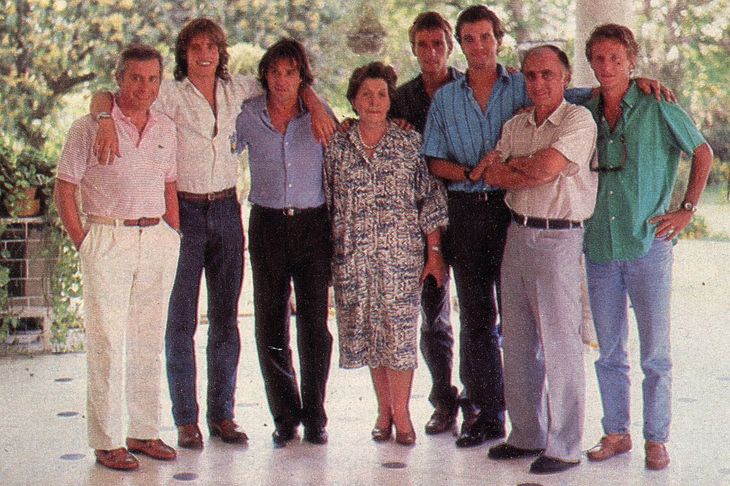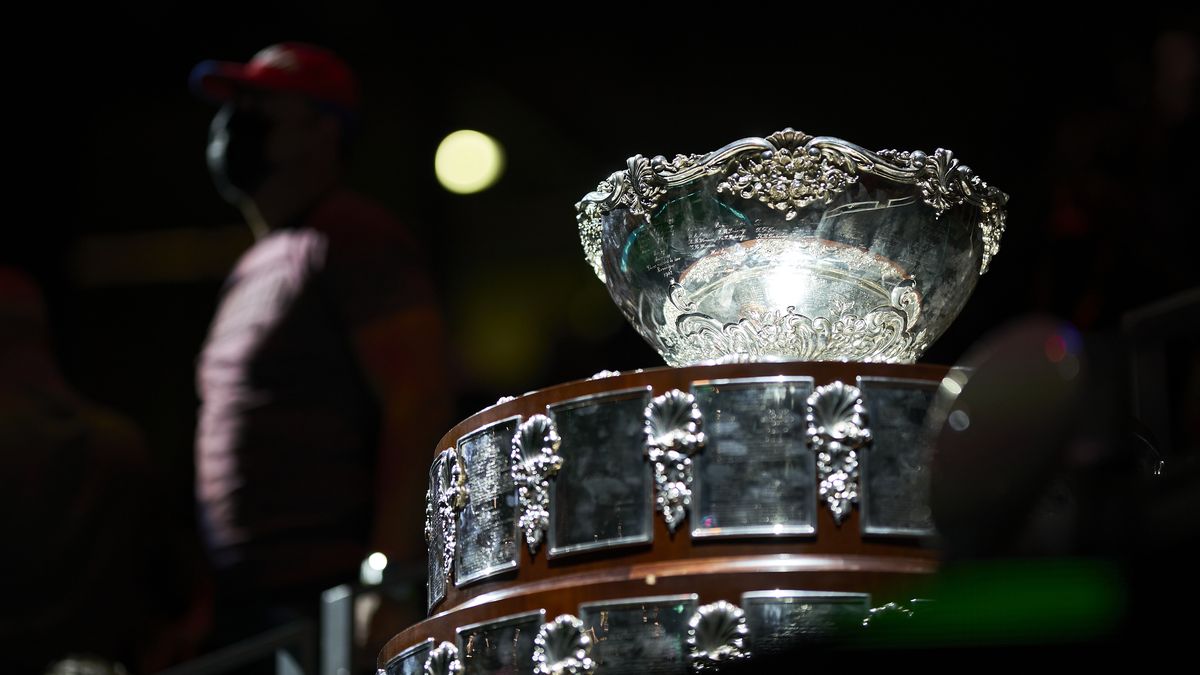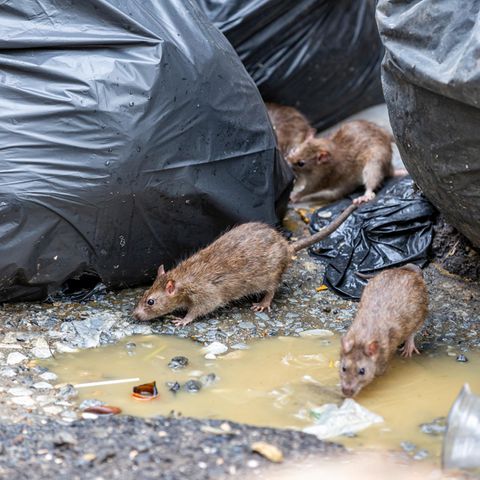Although the series seemed impossible due to the surface and the trip, Argentina had match point in its favor in the fourth point. “Tito” Vázquez, consulted by Ambitdescribed it with surgical precision: “Vijay served on the backhand of Jaite, who made an excellent parallel return in which the Indian, who was obviously serving and netting, took half a step back and overhitted him with a cross-court drop. Jaite was fine and arrived, he played it cross and Amritraj guessed and volleyed it parallel. And the game is over. “Martin suffered the blow.”.
Had they won that point, at 5-4 in the fourth set of the fourth point, the national team would have advanced to the second round of the World Group, where they expected Israelwhich had given a major surprise to Czechoslovakia. On the other hand, the Albicelestes (3-2 defeat in the decisive match) faced precisely the Europeans, who won 5-0 at home and sent Argentina to relegation.
But that was only the sporting edge of a story that transcended the yellow ball and the incipient graphite rackets. The experience that the albiceleste quartet and the coaching staff lived left indelible memories and amazing images that Ambit rebuilt together with its protagonists.
India, a country in a very different time
At the time when Diego Maradona was exciting in every game and Michael Jordan stopped being the child prodigy to become the best on the planet, India was far from being the emerging country that it is today, a member of the BRICS and one of the largest computing powers in the world. Throughout this year, bharat -name that he would officially take- he disputes China the title of the most populated nation in the world and, according to data from the IMFhas the fifth largest economy on Earth.
Davis Cup 1987 – India – Argentina – EG.jpg
The Delhi Lawn Tennis Association stadium, where Argentina lost 3-2 to India in the 1987 Davis Cup.
Liu Heung-Shing/AP (The Graphic, March 17, 1987)
On the contrary, they were times of equal overpopulation (around 700 million people lived, almost half as many as 36 years later), malnutrition and much more pronounced culture shock. The Westernization of the East was not commonplace and spirituality was the characteristic sign of the area.
“That series was crazy. “Going to play in India at that time was even dangerous for your health.”Frana evokes today at the request of this medium. Yellow fever, anger, typhus, hepatitis, some of the health risks to which the Argentine team was exposed. “But no one stuck out their chest, no one gave up or made any excuse. We knew that we were going to experience quite mobilizing situations,” says who is currently part of the work team of Sebastián Gutiérrez and Sebastián Báez.
Jaite was on the verge of an unprecedented victory for vernacular tennis. After 36 years, he recalls that the trip “was very long, more than a day,” with a stopover in Frankfurt and the subsequent arrival in New Delhi. “There was a very strong contrast between the luxury of the hotel we were in with what was seen around us. There was not so much destitution, but there was a lot of poverty. “It was a very low standard.”points out the director of the Argentina Open and also a member of the AAT Supervisory Commission.
Ambit He collected different testimonies from different Argentines who traveled to compete in that series and some stories leave anyone dumbfounded. Some attendees were surprised when they arrived at the city airport. Thousands of people crowded around the exit as if they were waiting for a legendary rock star to sign their photo. In reality, it was a bloody dispute to help anyone who had a suitcase to receive at least a few cents with which to buy food. Some even got into the taxi with the driver’s permission so they could sit in a more comfortable place than the dirt floor.
“It is a country that has poverty in a certain dignified way”adds “Tito” Vázquez, who stayed after the competition to learn more about the place: “You have to see it to believe it, incredible things happened to me”, qualifies. Many years later, the former captain returned to India with his daughter on a trip that was interrupted by the tsunami that hit the Indian Ocean area in 2004.
It was common to see crowds of people of all economic conditions in the streets, especially the needy. The requests for alms deafened the atmosphere, with mutilated people moving in special carts and smells that occupy a spectrum as diverse as local street food to unbearable public bathrooms with zero cleanliness. “Everything is intense there, the days can be difficult, but wonderful things happen the next. The counterpoint is that they have no resentment and they don’t do bad things, they don’t steal, there are no accidents despite the number of people.”Vázquez longs.
The contrast was always marked. The entire Argentine delegation, plus the journalists who attended and some fans, stayed in a world-famous hotel whose insignia is the S. Everything was luxury there; Outside, reality regained its presence. While comforts abounded in the accommodation, things unusual to see on this side of the Atlantic happened on the street: for example, cows, elephants and other animals with free movement on public roads.
Frana brings to the present a situation that is as complex as it is everyday: “The field that we had designated for training had perimeter wire to the street in a very public property, and malnourished kids showed up to see us. It was not easy for us to live with that, even in a complicated time in Argentina.”
Eating in India, an odyssey
“India at that time was an almost impossible place for us. It was going too far. We walked, we entered some houses; There were many people sleeping in a room, many on the floor, because it was their custom. “It was a very populated place.”maintains Jaite today, who focuses the flashback on a very necessary circumstance that he describes as “a big problem”: foodwhich in the land of Mahatma Gandhi is usually too spicy for our carnivorous palates.
It is public knowledge that the cow is a sacred animal, so the protein need had almost the exclusive option of chicken. “We saw that at the hotel they made it on the grill and it could be good, but it was hyper spicy. The tennis player in general has to take care of himself so that nothing happens to his stomach. Luckily, a few days later the Argentine ambassador invited us to eat,” the former number 10 in the ATP ranking reviews in the same vein as Frana, who suffered an allergic reaction after touching her face after eating.
The Argentine Davis Cup team was “rescued” by Teresa Flouret, his mother and the diplomatic employees. According to the few chronicles of the time such as that of El Grafico, almost the only survivor, roast poultry and homemade pasta made up the paradisiacal menu. The Raphaelino details the food desperation of those days: “We have dinner every day at his house. We couldn’t wait to arrive, the lady was very kind and hospitable. “She saved her life, because we would have had a very bad time.”.
Davis Cup Argentina India ambassador.jpg

The Argentine Davis Cup team with Teresa Flouret, national ambassador in India.
Liu Heung-Shing/AP (The Graphic, March 17, 1987)
According to the story of those who were in New Delhi, a particular situation stunned the foreigners. Every day passed two collection trucks, one for garbage and the other for people who died in the streets as a result of lack. It is difficult to be aware of this, but even more difficult to see it. “It’s shocking,” says Vázquez, because “here you feel bad for seeing someone on the street, and there everyone is. It is incredible, because it is also said to be the most spiritual country in the world.”
Both for “Tito”, who was the only one who had knowledge of India from his university days at UCLA, and for Jaite and Frana, the experience was wonderful, regardless of the sporting conclusion. But, from a distance, the former players recognize that they did not measure what they experienced.
“An experience like this opens your mind. In all that whirlwind that you are aware of today, we were playing tennis. Now I don’t regret it and I say how good it is, regardless of the result. What remains is the experience,” the former doubles player sensitizes. For Jaite, the trip “was very good. We lived 12 or 13 days together in a place that, if it weren’t for tennis, we wouldn’t have gone. I would have liked to travel much more. In the world of the Davis Cup, you are very confined in the hotel, we did not have that possibility.”
Sometimes, sport delivers these stories of madness and fun, of commitment and poverty, of unconsciousness and magnetism. In the words of the Chinese, a ying and yang which offers two sides of the same coin. The spirituality of a country with millions of poor people had become intertwined with the aristocracy of tennis.
Source: Ambito
I am Pierce Boyd, a driven and ambitious professional working in the news industry. I have been writing for 24 Hours Worlds for over five years, specializing in sports section coverage. During my tenure at the publication, I have built an impressive portfolio of articles that has earned me a reputation as an experienced journalist and content creator.




